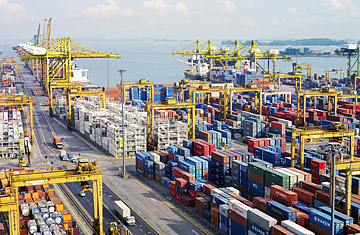
In late February, an iconic statue of the Merlion — the imaginary beast with a lion's head and fish's body that is the symbol of Singapore — was struck by lightning. The local blogosphere was instantly abuzz. Was it a bad omen? "I think this is a sign of Singapore in big trouble," worried one Internet commentator.
It doesn't take messages from heaven to know that Singapore is in trouble. The trade-dependent economy has been one of the worst hit in Asia. GDP in the fourth quarter of 2008 plunged 4.2% from the same period a year earlier, and the government believes the economy could contract by as much as 5% in 2009. Some analysts go further, predicting the drop could be as much as 10%. On Chinese New Year, even a classic dinner of chili crab was too much of an indulgence for most Singaporeans. "All recent indicators," Finance Minister Tharman Shanmugaratnam warned in his January budget speech, "point to a continuing downward momentum in the economy." (See pictures of Chinese New Year.)
Singapore's woes are no surprise. With a population of only 4.8 million, the city-state is almost completely dependent on the international economy for its growth. In February, exports plunged 24% from a year earlier, the fifth consecutive monthly double-digit decline. The government is furiously trying to pump up demand with a $13.4 billion stimulus package that includes tax rebates for both businesses and households. (See 10 things to do with your money.)
For its leaders, all this is vexing. Singapore did more than most in Asia to diversify the economy and reduce its vulnerability to slowdowns. Having learned its lesson in the last recession — the 2001-02 dotcom bust, which bit into Singapore's crucial electronics exports — the government launched a program to expand into new manufacturing sectors and beef up service industries. The results were surprisingly successful. Reliance on electronics was reduced with new exports of chemicals and pharmaceuticals, while the island became Asia's leader in private banking. Yet these efforts have meant little in the face of the current downturn. "When the whole market has stopped for everything, it doesn't matter if you're diversified," says Ajay Chhibber, director of the Asia bureau at the U.N. Development Programme in New York. Now that's a truly bad omen.
With reporting by Neel Chowdhury / Singapore